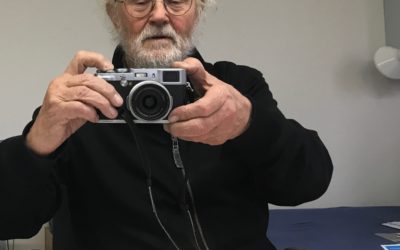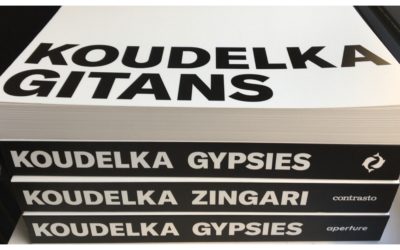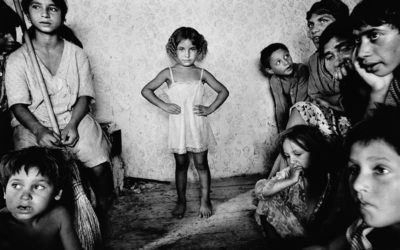
News
Josef Koudelka Donation to the Czech Republic
This press release from the Ministry of Culture of the Czech Republic is for the official announcement of the generous donation by the world-renowned photographer Josef Koudelka to the Czech Republic. The announcement is being made at the Ministry of Culture, in...
New book Gypsies
published in French (Delpire), English (Aperture, Thames and Hudson), Itálie (Contrasto).
Donation – list of works
Brief list of the conditions of Josef Koudelka donation to the Czech Republic - in 2018. First part of the donation to the Museum of Decorative Arts (2018) -Theatre, 1964-1970 (60 vintage prints) -Theatre, Three sisters (6 vintage prints) -Black triangle, 1994 (34...
Three Exhibitions of Photographs by Josef Koudelka in 2018

Koudelka: Returnings
March 22 – September 23, 2018
Museum of Decorative Arts in Prague
The retrospective “Koudelka: Returning”, a cross-section of the photographer Josef Koudelka’s work, is being held at the Museum of Decorative Arts in Prague to mark his eightieth birthday. The basis of the exhibition comprises a large set of four hundred works, which Koudelka has generously decided to give to his native land. The Museum of Decorative Arts in Prague will manage it thus becoming the only institution in the world to have such a large collection of the oeuvre of this world-renowned photographer. The exhibition includes all of the well-known series of Koudelka’s work so far (Beginnings, Experiments, Theatre, Gypsies, Invasion 68, Exiles, and Panoramas). Included are many unique vintage prints, some of which are presented here for the first time.
The exhibition is accompanied by a comprehensive volume in Czech and English editions, containing most of Koudelka’s best-known photographs, several articles, a chronology of his life, a list of his exhibitions, and a large bibliography.
Exhibition details
This large retrospective exhibition is being held at the Museum of Decorative Arts in Prague to mark the exceptionally generous gift that Josef Koudelka is making to his native land. It is also a celebration of the eightieth birthday of this leading figure of contemporary photography.
The exhibition is arranged chronologically in seven sections, each comprising an individual thematic series. The first, called Beginnings, consists of rare vintage prints from the late 1950s and early 1960s, which were made by Koudelka for his first exhibition, at the Semafor theatre, Prague, in 1961. The next section, called Experiments, consists of early studies, which are important for comprehending Koudelka’s the originality. The next two series were made in parallel – Koudelka’s key work, Gypsies, which is today widely considered a classic of world photography, and the Theatre series, in which he takes the stylization of form to the extreme, with striking graphic images displaying what is now perceived as Koudelka’s unmistakable style in the theatre photography of that period. Invasion 68, his large reportage series, has played a particularly important role in Koudelka’s life. It was the reason that he was forced to leave the country in 1970. The Exiles series took Koudelka twenty-five years to make. It consists of photographs capturing feelings of alienation, expulsion, and the impossibility of return. The last section of the exhibition consists of the monumental Panoramas, large-format photographs that were made over three decades, in which he charts out the influence human beings have had on the contemporary landscape.
Today, Koudelka’s photographs are widely appreciated primarily for their high artistic value and also for the fact that he has never made a large number of prints; some of the earliest photographs exist in only several copies. This contributes greatly to the uniqueness of the set of photographs he is donating to the Museum of Decorative Arts in Prague. The Museum is thus becoming one of the few institutions to have in its collections and care such a large set of Koudelka’s work. His work is also owned by prestigious institutions like the Centre Pompidou and the Maison Européenne de la Photographie in Paris, the Museum of Modern Art in New York, the Art Institute of Chicago, the J. Paul Getty Museum in Los Angeles, and the Victoria and Albert Museum in London.
To accompany the exhibition, a large book is being published by KANT, in Czech and English editions, containing a wide selection of Koudelka’s photos, documentary illustrations, and articles by Stuart Alexander, Josef Chuchma, Jan Mlčoch, Josef Moucha, Tomáš Pospěch, and Irena Šorfová, together with a reprint of an article by Anna Fárová first published in 1967.
The Koudelka: Returning retrospective is in a certain sense Koudelka’s return to his homeland, even though he continues to be a globetrotter, always on the road, photographing and working on his projects. During a life of ceaseless labour, he has repeatedly returned to his photographs, just as he has over the years repeatedly returned to the same places, topics, and subject matter, with the aim of achieving the best photographs. The Exiles series was twenty-five years in the making. Similarly, for twenty-five years he returned to places around the Mediterranean, resulting in the project of panoramic photographs called Vestiges. Koudelka’s work matures with time and even thirty or forty years later he believes that it makes sense for him to return to it and to publish new books that are relevant today.
During his life, Koudelka has always travelled his own path. He has never succumbed to outside influences or artistic trends. He has crossed the boundaries of various forms of expression, from reportage to graphic-art-like works, poetic documentary photography, and even large-format art. He has continuously reshaped his style and adapted it to the topic he is photographing. Koudelka unquestionably is among the most important contemporary photographers working today. He is often included amongst humanist documentary photographers, but it would be misleading to pigeonhole this distinctive character. Though many people have made good individual photographs, few have left such a remarkable legacy with their work as a whole.
The Museum of Decorative Arts in Prague has the largest collection of Czech photography in the world. It photos are regularly presented at dozens of exhibitions in this country and outside. Koudelka’s donation is exceptionally important. Together with the sets of photographs by František Drtikol and Josef Sudek, also donated to the Museum, the gift from Josef Koudelka will be among the most important sets of world photography in any Czech collection.
Concept: Josef Koudelka
Curator: Irena Šorfová
Exhibition design: Emil Zavadil
Graphic design of the book and the exhibition: Aleš Najbrt
Production: Dušan Seidl – UPM, Pavlína Malásková
The retrospective is part of the Czech government programme to commemorate the 1968 invasion
The book was published by KANT and Museum of Decoratove Arts, 2018. Texts by Stuart Alexander, Anna Fárová, Josef Chuchma, Josef Moucha, Tomáš Pospěch, Irena Šorfová. Book is in Czech and English editions.
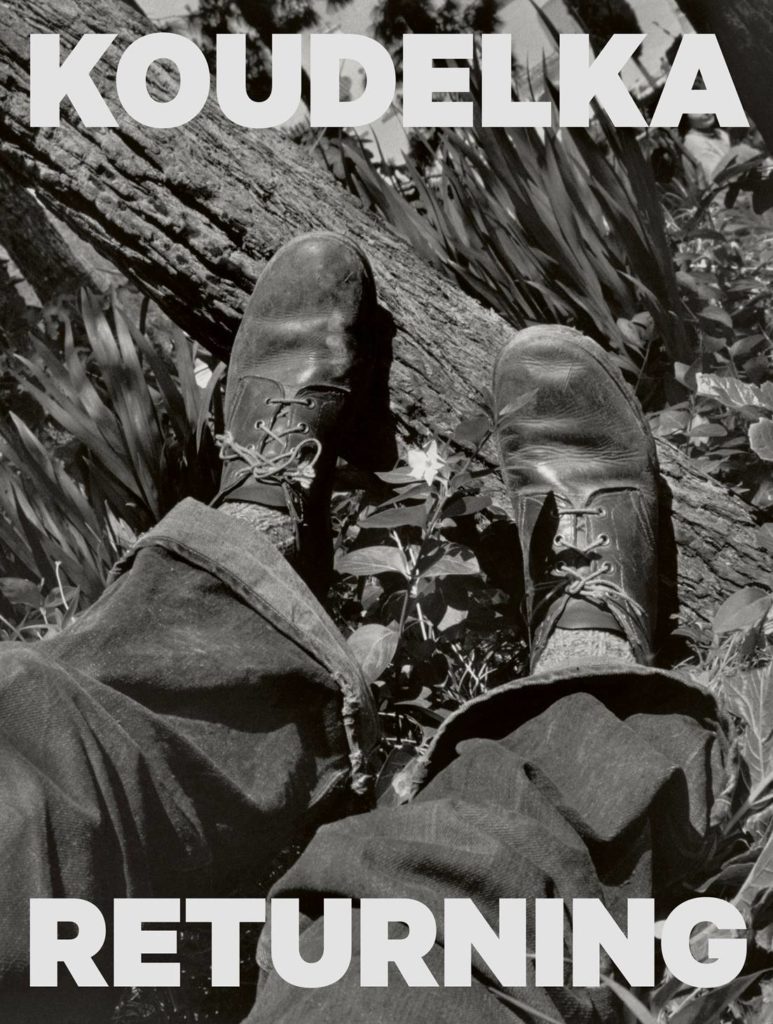
The exhibition is organized by the Museum of Decorative Arts in Prague, www.upm.cz
Press manager: Radka Potměšilová, potmesilova@upm.cz
At the same time as this retrospective, an exhibition, Koudelka: De-creazione, is being held at the National Gallery in Prague, www.ngprague.cz

Koudelka: De-creazione
March 22 – September 23, 2018
National Gallery in Prague, Veletžní Palace
In addition to the large gift to the Museum of Decorative Arts in Prague, Koudelka has also given an important set of photographs to the National Gallery here. It is a series of twelve large-format photographs entitled De-creazione, which he made for the Vatican Pavilion at the 55th Venice Biennale in 2013. To mark the donation, the set is exhibited at the National Gallery in the Trade Fair Palace, Prague, together with the retrospective at the Museum of Decorative Arts in Prague.
Exhibition details
‘Man is not the omniscient master of the planet, who can get away with doing whatever he likes and whatever may suit him at the moment.’ — Václav Havel at the Environment for Europe conference, 1991
The series of photographs called De-creazione was made by Josef Koudelka for the Holy See Pavilion, the Vatican’s first presentation at the Venice Biennale, in 2013. In addition to inviting Koudelka, the Vatican Museums also commissioned the Italian art group Studio Azzurro and the Australian painter Lawrence Carroll to join this project. The artists were asked to submit works on three themes inspired by the Book of Genesis – Creazione, De-creazione, and Ri-creazione. For this, Koudelka chose a topic he has devoted himself to intensively for thirty years and has so far summarized in fifteen published books: irreversible changes human beings have made to landscapes.
Koudelka’s De-creazione is a series of eighteen photographs, comprising nine large horizontal panoramas (91 x 257 cm) and three vertical triptychs (158 x 150 cm). It covers three main topics that Koudelka has chosen to express the idea of destruction: the influence of time in human history and the natural environment, including changes brought about by earthquakes and other natural disasters, which have affected us for centuries; wars, walls, and other barriers we build, emblematic of our fears and hatreds; and, ultimately, two opposites – the natural world and the industrial world –, which have long been in conflict with each other, no less painfully and destructively than other conflicts. By means of these large-format pictures, Koudelka’s sensitive involvement in his topics draws attention to the imbalance in the relationship between human beings and the natural environment, and also reveals the human inclination to destruction. ‘Just as there are crimes against humanity, so too there are crimes against landscapes. How people try to justify these crimes or what they call them is not so important. People can defend themselves, but a landscape cannot,’ says Koudelka.
‘Art may not be able to change the world but it can shake it up – this statement is perhaps the best way to describe the artistic mission of Josef Koudelka, one of the most striking artists of our time. In his rich photographic work, the poetic refinement of his artistic genius changes into an uncompromising political gesture and vice versa – the need for unflagging and uncompromising criticism of society triggers the sensitive creativity of this artist. I am sincerely grateful to Josef Koudelka for the extraordinary generosity he has shown in donating the De-creazione series to the National Gallery in Prague and for the friendly atmosphere helped to create when preparing its presentation for our visitors.‘ — Jiří Fajt, Director of the National Gallery in Prague
For their work on this project, Josef Koudelka thanks: Cardinal Gianfranco Ravasi, prezident papežské rady pro kulturu/ President of the Pontifical Council for Culture, Antonio Paolucci, Micol Forti – the Vatican Museums; Alessandra Mauro and Roberto Koch; Peter MacGill, Lauren Panzo – Pace/MacGill Gallery (New York); Lawrence Barth; Irena Šorfová.
The exhibition is accompanied by the book Koudelka DeCreazione published by the National Gallery in Prague. Ed. by Josef Koudelka and Irena Šorfová, text by Irena Šorfová, graphic design Aleš Najbrt.
The exhibited series of photographs has been generously donated by the artist to the National Gallery in Prague. At the same time as this exhibition, a retrospective, Koudelka: Returning, is being held at the Museum of Decorative Arts in Prague.
Exhibition Concept: Josef Koudelka
Curator: Irena Šorfová
Graphic design of publication and exhibition: Aleš Najbrt
Production manager: Lucie Šafaříková
© Photographs Josef Koudelka/ Magnum Photos

Koudelka: Invasion 68
August 22, 2018 – January 6, 2019
National Gallery in Prague, Veletžní Palace
The day before the Soviet-led Warsaw Pact invasion of Czechoslovakia in August 1968, Koudelka returned home from Romania, where he had been photographing Roma. Though he had never done reportage before, he made a huge number of remarkable precise photographs in the dramatic days of the invasion, resulting in a monumental set that is today generally considered one of the most important photo essays of the twentieth century. Always in the midst of the action, he documented situations, faces, writing on the wall, posters in Prague streets – not as a disinterested observer, but as one of the people whom he was photographing.
Exhibition details
Some of the photographs were smuggled out of the country and to the United States, where they reached the Magnum Photos agency. Koudelka’s photo essay was published in 1969, to mark the first anniversary of the invasion, and it was the main story in many periodicals around the world, but without Koudelka knowing about it beforehand. In an effort to protect him and his family, Magnum had credited these photographs to ‘P.P.’ (Prague Photographer). In the same year, Koudelka received an important distinction when the Overseas Press Club awarded the Robert Capa Gold Medal to the ‘anonymous Czech photographer’.
Because the Czechoslovak police could have easily figured out who had made the photographs, Koudelka, in 1970, did not return from his travels in western Europe, which he had set out on at the invitation of Magnum in order to document the Roma. Not until 1984, after the death of his father and at a time when his family would no longer be in danger, did Koudelka first publicly admit that he was the photographer of those images. The photos were shown at his first big exhibition, in the Hayward Gallery, London, in 1984. They were finally published in Czechoslovakia in 1990, in a supplement to the Respekt weekly, 22 years after they were made. This set goes far beyond the boundaries of documentary photography. It has become a potent symbol, not only of this national tragedy, but also of any act of military oppression and the fight for freedom.
‘I think that these photos of mine have mainly a documentary value. But maybe in the best of them they have more than just that. What is important in the photographs is not who’s a Russian and who’s a Czech. What’s important is that one person has a gun and the other hasn’t. And the one who hasn’t is, in fact, the stronger, even though that’s not immediately apparent.’
Josef Koudelka, 1990
Concept: Josef Koudelka
Curator: Irena Šorfová
Graphic design of the book and exhibition: Aleš Najbrt
Production manager: Lucie Šafaříková
Film Projection: Zdeněk Jiráský
© Photographs Josef Koudelka/ Magnum Photos
The exhibition is part of the Czech government programme to commemorate the 1968 invasion.
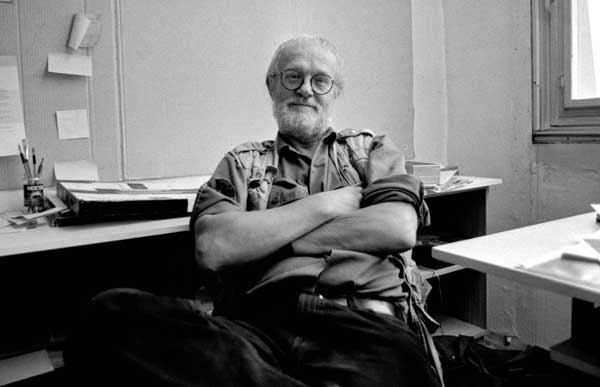
Donation
Years ago, Koudelka decided to donate to his native land a large set of photographs that represent his life’s work. ‘I think that the best that I have ever done in my life should remain in the country where I was born,’ he said publicly in 2002 during the press conference for his exhibition at the National Gallery in Prague, where his works were first shown in a far greater scope than before.
More
In 2007, he approached the Museum of Decorative Arts in Prague with this proposal. The negotiations to make it a happen took six years, during which the Czech Republic had six different ministers of culture. The main topic of the talks at the many meetings was the terms and conditions of the gift, which Koudelka insisted on, and are entirely in keeping with established international customs.
In 2013, an agreement was signed for the long-term loan intended as a gift. Five years later that agreement has changed into a gift agreement for part of the set, while the other part of the set has been promised in the future. During that time, the Museum of Decorative Arts built a new repository, in which some of Koudelka’s photographers have already been deposited.
‘Everybody told me I was crazy to give my life’s work to the Museum,’ said Koudelka. ‘Nevertheless, I hope that with the newly remodelled building and the new repository, the staff will be increased and the overall conditions better, so that my works will be looked after properly.’
The basis of this gift to the Museum of Decorative Arts in Prague comprises more than 300 photographs, which represent a cross-section of Koudelka’s entire work, presented in 2002 at his retrospective in the National Gallery in Prague and then in other important museums outside the country. In addition, the gift contains almost 400 other photographs from various periods of his work, recently added to with a large set of vintage prints from the Gypsies series and a set of large-format photographs of ruins of classical civilization in the Mediterranean, entitled Vestiges. In total, the gift comprises 800 works.
Koudelka’s photographs are appreciated today mainly for their high artistic value, and also thanks to the fact that he has never made prints in large numbers; some of his earlier works exist in only several vintage prints. This also greatly contributes to the uniqueness of the set donated to the Museum of Decorative Arts, which thus becomes one of the few institutions in the world, whose collections contain so many of Koudelka’s works. Amongst the main museum collections with works by Koudelka are the Centre Pompidou, Paris, the Maison Européenne de la Photographie, Paris, the Museum of Modern Art, New York, the Art Institute of Chicago, the J. Paul Getty Museum, Los Angeles, and the Victoria and Albert Museum, London.
In addition to the large gift to the Museum of Decorative Arts in Prague, Koudelka has also given an important set of photographs to the National Gallery here. It is a series of large-format photographs entitled Decreazione, which he made for the Vatican Pavilion at the 55th Venice Biennale in 2013. To mark the donation, the set is exhibited at the National Gallery in the Trade Fair Palace, Prague, together with the retrospective at the Museum of Decorative Arts in Prague. To the Moravian Gallery in Brno, which has built up a very valuable collection of photographs, Koudelka is donating selection of photographs from all his major series.
Art Link | e-mail: artlink@artlink.cz | artlink.cz
